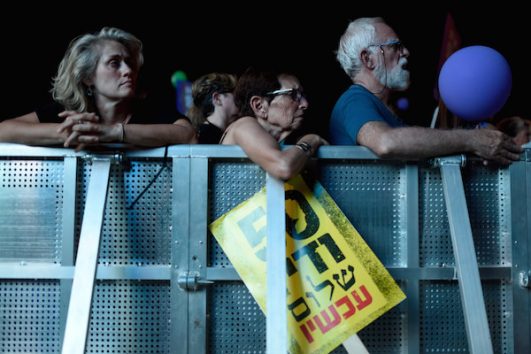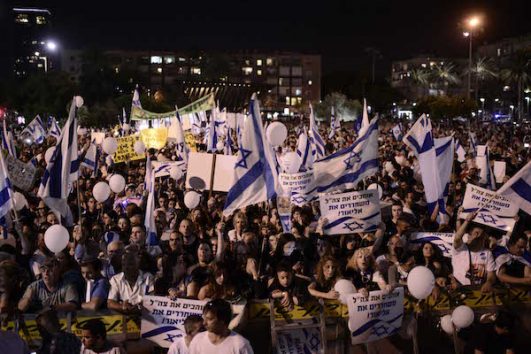There are no negotiations on the horizon, no deals on the table and no calls to end the violence. This moment in Israeli politics is dismal, yet sobering.

It was hard not to feel just a bit giddy in recent weeks about the possibility that corruption investigations against Israeli Prime Minister Benjamin Netanyahu may eventually bear fruit. It was also hard not to feel some excitement about the prospect of early elections due to a coalition breakdown, which would mean the possibility, however minute, of ending Netanyahu’s nearly decade-long reign. Even though Netanyahu’s conviction is still out of reach, and general elections, whenever they happen, are no reason to rejoice —Netanyahu’s Likud Party continues to dominate the polls, and the alternatives are all variations on the same theme — it was tempting to feel there might be a minuscule ray of light in the endlessly dark tunnel. A sudden bit of oxygen in the room.
For those of us who have been living, following and writing about Israeli politics for many years, the current moment is significant. Not because there is anything new, but precisely because nothing is new. For those of us who internalized some time ago that Israel’s occupation is not an unavoidable situation or a temporary condition, but, in fact, the country’s largest national project; for those of us who have for years scoffed at the notion of an American-mediated “peace process” — this moment is significant.
For the first time since I can remember in my brief lifetime, we are squarely in a period where there is not only no peace process, but no facade of one, no developments to look forward to except for further violence. There are no negotiations on the horizon, no deal on the table, no set of parameters, no scheduled summits, no backdoor meetings, no time-frames, no guiding principles, and no calls to end the violence. The Trump Administration’s entrance a year ago, and its subsequent policy decisions, has made this all the more evident. While it is refreshing that there are no longer any smokescreens, it is also utterly depressing.
Growing up in the 1990’s, I remember there was always some benchmark in Israeli politics and its conflict with Palestinians to look forward to, always some ball in motion, some hurdle to cross, something to somehow feel hopeful about. When I was 12, Rabin and Arafat shook hands on the White House Lawn, and I remember hearing the excerpt from Rabin’s speech over and over again for months afterward: “enough of blood and tears, enough.” I remember feeling hopeful. Then Rabin was murdered, Netanyahu was elected, and of course, years later, I became politically conscious. I realized what a farce the Oslo agreement was, providing cover for Israel’s continued settlement enterprise and creating the basis for a Palestinian puppet regime that remains in power in the West Bank. But there was nonetheless a general consensus in Israel about the need to end the violence. Or at least a semblance of it. There was an atmosphere of sadness and regret for the continued violence.
Can you imagine anyone in Israeli politics turning to the Palestinians today and saying, “enough of blood and tears enough?”

In today’s Israel, violence against Palestinians is rewarded and bereavement is revered. On Monday, Israel’s military announced that Elor Azaria, the soldier convicted of manslaughter after killing a wounded and incapacitated Palestinian assailant in Hebron, will be released in May, reducing his already short 18-month sentence. He will have served a total of nine months in prison, less than many Israelis who refuse to serve in the army because they oppose occupation and less than most Palestinian “security” prisoners who are held in Israeli jails without charge or trial. Also this week, an Israeli educator Miriam Peretz received the Israel Prize for lifetime achievement — the country’s most prestigious prize for a civilian — for “strengthening the Jewish-Israeli spirit.” Peretz, a bereaved mother of two IDF soldiers, lost both her sons twelve years apart, in operations in Lebanon and Gaza, respectively.
Since the start of 2018, 19 Palestinians have been killed, six of them minors, by Israeli soldiers, with the exception of one killed by an Israeli civilian from a settlement. In January and February alone, the Israel Defense Forces arrested 1,319 Palestinians, 274 of them minors, 23 women, and four journalists. Israel recently shot a child in the head with a rubber bullet and then arrested him (while still recovering and awaiting surgery) in the middle of the night in his bed and pressured him to admit that his head injury was from falling off a bike. Israeli soldiers were recently caught on film violently preventing Palestinian medics from treating a Palestinian who they had shot. Another recent video shows IDF soldiers beating a Palestinian man, who later died of his wounds.
In the meantime, Israeli life goes on as usual. In fact it prospers. In 2017, Israel’s economy grew three percent, and it is projected to continue to stay strong.
Today, Israeli state violence and disregard for human life is evident and no longer downplayed or denied. Earlier this month at the Economic Club in Washington, Netanyahu said that Israel intends to continue military control over the West Bank indefinitely. Justice Minister Ayelet Shaked admitted that Israel seeks to maintain Jewish dominance at the expense of Palestinian human rights. Israel’s Foreign and Culture Ministries are busy boycotting a fictional film made by an Israeli war veteran that doesn’t make the IDF look like the most moral army in the world.
In May, Israel will mark 70 years of existence by inaugurating the U.S. embassy move to Jerusalem, possibly attended by President Trump, a move which is no less than a declaration of war on Palestinian self-determination and any kind of viable resolution.
As an Israeli and as a journalist, I have been horrified and angry and indignant and cynical and jaded over and over again for years. This moment in time makes obvious even to the naked eye the devastation and disillusionment that me and many of my peers have felt for a long time. In a way, it is bittersweet catharsis.

